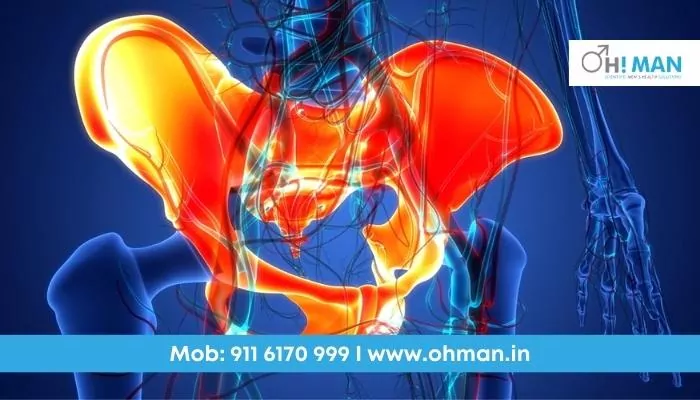Pelvic Congestion Syndrome: Symptoms, Causes & Treatment
Pelvic Congestion Syndrome: Symptoms, Causes & Treatment

Pelvic congestion syndrome is a chronic illness that may cause persistent pelvic discomfort in men and women. Those affected are typically around 20 and 45 years old. Patients suffering from pelvic congestion syndrome report a significant, dull discomfort or pain in the belly, groin, pelvis, and/or genitalia. This may be the outcome of pelvic varicosities, which manifest similarly to leg varicosities. As blood accumulates or persists in the pelvic veins, the intravenous pressure rises due to vein wall weakening and the vein’s failure to release blood adequately. So this results in pressure discomfort, aching, and throbbing, leading to pelvic nerve irritation.
Further, the condition often produces continuous, dull discomfort in the pelvic region, worsening at various times and under varied circumstances. It is more prevalent among women who have already given birth.
According to experts, it may cause discomfort in up to 30% of those with persistent pelvic pain.
Table of Content –
Who Is At Risk Of Pelvic Congestion Syndrome?
A few risk factors may increase the likelihood of pelvic congestion syndrome.
In women, past pregnancies may be the major causes, especially if a woman gave birth to more than one child.
Moreover, pregnancy may modify the pelvic anatomy, influencing the capillaries. Furthermore, the quantity of blood in a woman’s body grows during pregnancy, increasing the strain on the blood vessels, and elevated estrogen levels may compromise the lining of blood vessels.
Other risk elements include:
- A familial history of the condition
- A uterus that is retroverted or tilted
- Hormonal dysfunction
- Polycystic ovaries
- Excessive weight on the legs
Further, men who have undergone through the following can be at a higher risk of PCS:
- Prostrate Cancer Surgeries
- Treatment of UTIs using antibiotics

Is Male Pelvic Congestion Syndrome Myth?
The PCS is extensively investigated in females, although there are few articles relating to its male counterpart. Prostatitis is perhaps the most common disorder of the genito-urinary male system. However, in most instances, the cause of these disorders is unclear.
Recent reports indicate that intra-pelvic venous congestion, particularly around the prostate, is prevalent in individuals with prostatodynia.
Patients experiencing intra-pelvic venous congestion syndrome often have inadequate blood flow to the internal pudendal arteries. Cultures of H. pylori were usually linked with pelvic congestion due to copious quantities of harmful ammonia inside the colon.
Under the impact of antibiotic aggressiveness, H. pylori might move or be pushed to shift to the colon, resulting in the deposition of copious quantities of ammonia uncontrolled or neutralized by any acid. Deposition of excessive ammonia in the colon is harmful and may result in pelvic congestion. Additionally, the enhanced mucosal production of inflammatory cytokines by H. pylori may play a crucial role in the pathophysiology of Erectile Dysfunction.
Based on this evidence, the fact that cytokines accrue in the system with or without evident vascular inefficiencies, and the results that male pelvic congestion is connected with male sexual dysfunction, it may be concluded that cytokines contribute to male sexual dysfunction.
Pelvic Congestion Syndrome Symptoms
Pelvic discomfort that lasts nearly six months is among the most common pelvic congestion symptoms. Additionally, this discomfort usually begins during or after pregnancy, and it may intensify during a subsequent pregnancy. Furthermore, the discomfort may be heavy or painful. Or the pain might be severe. Typically, the discomfort on one side, to the left. Occasionally, you might feel it from both sides, and sometimes, the discomfort is most significant towards the end of the day.
Further, people with PCS usually state that the mild pain is constant but that it intensifies in particular circumstances, such as:
- prolonged standing
- in the last months of pregnancy
- days before menstruation
- maybe during evenings
- during and after sexual activity
- dysmenorrhea (painful menstruation)
- irregular menstrual bleeding
- Varicose veins in the genital region, buttocks, and legs.
- Unusual vaginal discharges vaginal or vulvar enlargement
- Pelvic discomfort intensifies after menstruation, during sexual activity, or following specific physical activities.
In addition to pain, patients may also have additional PCS symptoms and various combinations of such symptoms. Also, the intensity might vary considerably amongst both men and women. So, these symptoms may consist of:
- headache
- depression
- tiredness
- abdominal soreness
- increased urination
- symptoms of irritable bowel syndrome
- hip discomfort
Constriction of the iliac vein may lead to inefficient blood circulation in the deep veins of men leading to PCS. Their symptoms may vary, but individuals still report heaviness or discomfort in the pelvic/abdominal area.
The Pelvic Congestion Syndrome Causes
Research is still finding the pelvic congestion syndrome causes among men and women.
Male pelvic congestion syndrome is overlooked in the medical and often incorrectly identified as prostatitis syndrome. Moreover, the pelvic congestion syndrome causes in men can be due to scrotal varicoceles, prostatitis condition, and pelvic floor muscle impairment. Pelvic varicosities and procedures like varicocelectomy may induce them.
In fifty percent of male infertility patients, pelvic congestion syndrome is present. Testicular atrophy could also be a possibility.
In women, the most prevalent pelvic congestion syndrome cause is pregnancy.
Pregnancy is believed to be the most prevalent cause of PCS. There are several possible causes for the onset of this syndrome during pregnancy:
- The pelvis may undergo structural modifications during pregnancy, and these alterations may impact some blood arteries, which raises the likelihood of developing varicose veins.
- Additionally, the body often acquires fluid and weight for supporting the unborn. Occasionally, the veins cannot handle the amount of fluid. They get so swollen that the valves may damage, allowing blood to flow and return through them, causing them to become varicose.
- Pregnancy causes PCS because the increase in estrogen impairs the blood vessel walls.

Pelvic Congestion Syndrome & Sexual Dysfunction In Men –
Weak pelvic floor muscles due to Pelvic congestion syndrome can cause many sexual dysfunctions in men, including erectile dysfunction & Premature ejaculation. According to NCBI , 34% of patients with PCS have erection problems & 55% of patients suffer from premature ejaculation problems. However, Premature Ejaculation Medicineslike tadalafil & Sildenafil Medicine for Erectile Dysfunction can help you control these problems momentarily but keeping your pelvic floor muscle can solve these problems effectively.
Diagnosis
Pelvic congestion syndrome is difficult to identify. Pelvic discomfort is prevalent, and its causes are diverse. The discomfort may be due to issues with the reproductive organs like uterus and ovaries. It may result from the urinary system, such as the bladder. Moreover, it could be due to the digestive system, large intestine. And it might originate from muscles or bones.
Further, chronic pelvic discomfort may also due to mental disorders. Before diagnosing, your healthcare professional will explore several potential reasons.
Either your general doctor or OB/GYN will diagnose the condition, and they will question your medical history and symptoms. Further, there would also be a physical examination, which will probably include a pelvic examination.
You may additionally need the following tests:
- Urine examinations to detect urinary system abnormalities
- Blood tests can detect pregnancies, sexually transmitted infections (STIs), anemia, etc
- Pelvic ultrasonography for the detection of pelvic tumors
- Doppler ultrasonography to assess pelvic vessels
- CT scan or MRI for imaging for further detailing
- Laparoscopy to diagnose any other cause of pelvic discomfort
- A technique using pelvic vein X-rays (venography)
In men, the PCS diagnosis process includes:
- Examining medical history
- Looking for scrotal varicoceles
- Prostrate Examination
- Pelvic Venography
- MRI to look for prostrate health, and testicular pain or check the blood flow through the prostrate or looking for any vein problems.
Pelvic Congestion Syndrome Treatment
Generally, treatment for PCS aims to reduce and alleviate symptoms. The illness has no definitive treatment and might be difficult to treat. Your doctor might
Presently, the most appropriate treatment is pelvic vein embolization. This is a minimally invasive procedure technique. The process aims to block pain-causing varicose veins by this technique. Further, studies show good improvement following the surgery. However, as with any medical procedure, this treatment may not suit all patients.
Other treatment include:
- Medications that inhibit ovarian activity by releasing the hormone gonadotropin.
- Progestin hormone medications for pain relief
- Surgery to remove damaged veins
- Surgical removal of the uterus and ovaries
Advanced manual treatments, such as joint mobilization, myofascial release, retrograde massage, lymphatic drainage methods, craniosacral, and integrated manual therapy, may help. Other helpful methods include physical interventions, pelvic floor muscle restoration, and pain-alleviating techniques like electrical stimulation.
Additionally, there is pelvic congestion syndrome natural treatment like Kegels. So Kegels would assist in strengthening the weaker vein and promote draining of fluid that has gathered in the pelvic area.
Bottom Line
Pelvic congestion syndrome is not a syndrome that impacts life span, but it may substantially influence the quality of life.
Chronic discomfort, pain throughout the sexual engagement, and dysmenorrhea may result in decreased physical activity, function loss, and despair.
A diagnosis does not always imply that you will be afflicted to this degree; the intensity of PCS varies widely.
Remember that treatments aim to reduce your symptoms and assist you in coping with your condition. Discuss your alternatives with your doctor. You can take online consultancy from ohman regarding your condition. Ohman is a online portal that specializes in men sexual health with it’s team of expert doctors. You can also buy FDA-approved medicines and PDE5 Inhibitors for erectile dysfunction and premature ejaculation medicines online. Here are some medicine that can help you in your sexual activities even at PCS but make sure to use them after proper consultation.
Order Now from Ohman



